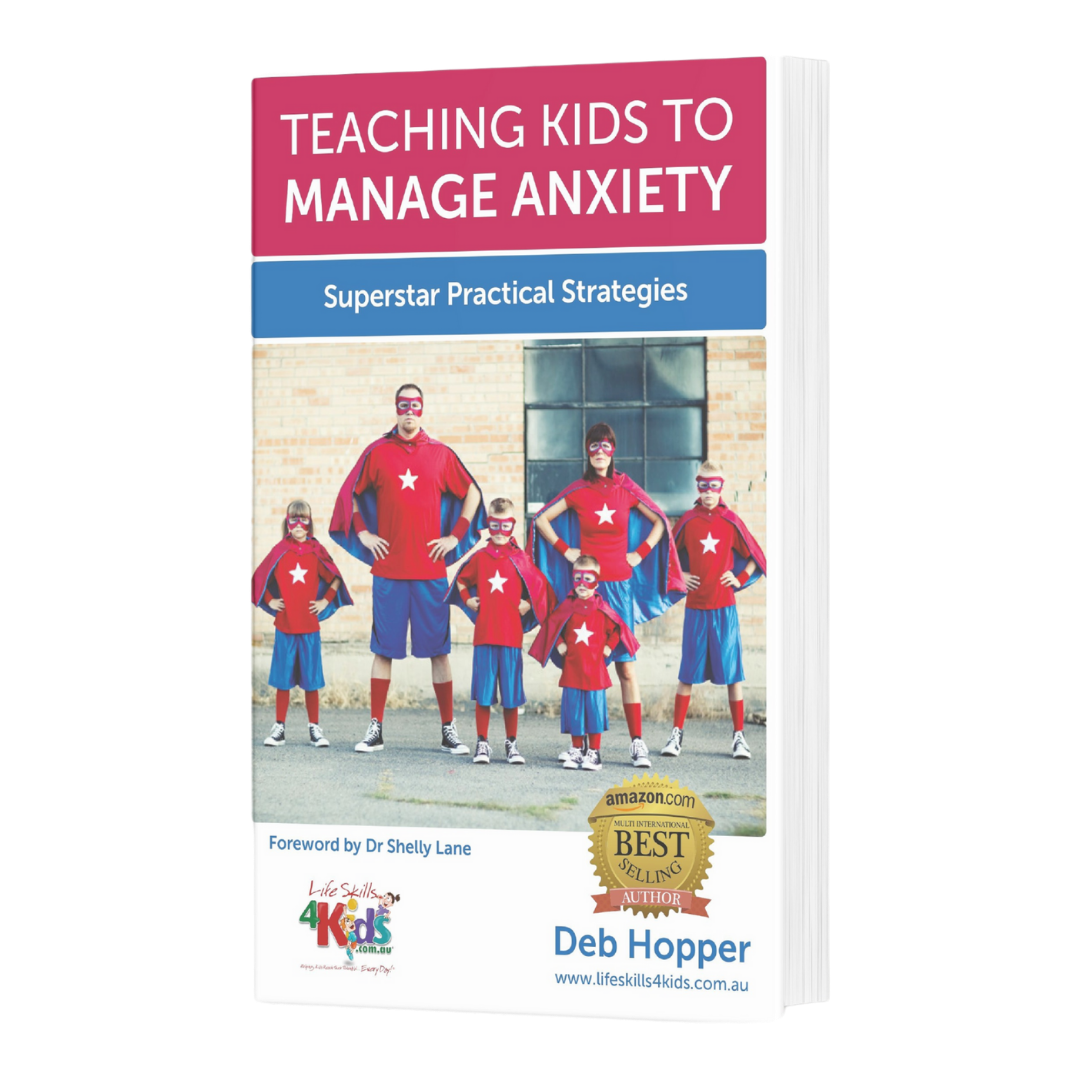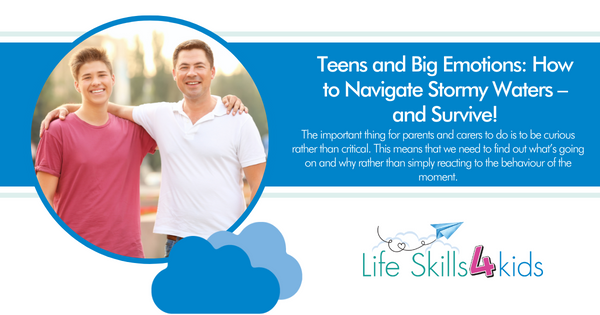Big emotions and adolescence go together; it’s a fact of life, and we’ve all been through it. But how we get through it is crucial for emotional success as an adult, and that’s where parents and carers play a vital role in helping teens to learn emotional literacy.
What is emotional literacy?
Also known as emotional IQ, emotional literacy is the ability to understand emotions, develop healthy processing strategies, and learn to live with the emotional ups and downs of life without being overwhelmed or shutting down. Many teens struggle with finding a path through the emotional jungle of adolescence, but those that do emerge on the other side with greater empathy and coping skills.
Seeing it from their side
While we might see the stereotypical teenage tantrum or moodiness, we tend to forget that the interactions we have with them make up only a small part of their overall experience. Teens are under pressure from many different angles, such as bullies at school, friendships that come and go, teachers who may not understand them, family drama or conflict, school workload, and other endless causes of stress. All of these things coupled with the hormonal and bodily changes brought about by adolescence can add up to create an intense emotional cocktail that produces big emotions.
The important thing for parents and carers to do is to be curious rather than critical. This means that we need to find out what’s going on and why rather than simply reacting to the behaviour of the moment. The other thing that teens need from us is validation.
Why is validation important?
Being understood and loved anyway is a basic human need. Validation tells a teen, “I understand what you’re going through. I may not love your behaviour, but I love you. Let’s get through this together.”
Aside from helping teens to feel valued, validation can also help to de-escalate an intense emotional moment, and when a trusted adult models validation, it teaches teens how to self-validate. This is an important coping skill when they face emotional situations that may be overwhelming.
Validation begins by meeting teens where they’re at and finding the middle ground between extremes.
Meeting in the middle
Because many teens lack the skills they need to cope with big emotions, they often find themselves at extremes. On one hand, there is the teen who allows their emotions to control their life. This
person may be unable to function in daily life because they are at the mercy of the emotional ups and downs that turn them into a mess.
On the other hand are the teens who “stuff” their emotions inside to function in daily life. This might work temporarily, but over time, those big emotions usually overflow because they have not been processed and dealt with. This can result in harmful or destructive behaviour such as substance abuse or self-injury.
In the middle is a healthy balance, where teens can learn to acknowledge their emotions, process them in healthy ways, and still cope with everyday life.
So, what can parents and carers do to help teens find a healthy middle ground?
Strategies to help teens process big emotions
Try these tips to help your teen deal with their emotions.
1. Talk it out
Teach teens emotional literacy by asking leading questions, talking about real or hypothetical scenarios that involve emotions, or encouraging self-expression through journaling. Talk about how to identify emotions, what they mean, and how to describe them.
2. Validate their feelings
Validate teens’ feelings by saying something such as: “That must be tough. I’m here for you.” Or, “I can see that you’re going through a hard time. You’re feeling sad/angry/hurt right now, and that must be tough.”
It’s important to remember that validation is not agreeing; it is an affirmation of your teen’s experience and their ongoing value in your eyes. It’s also important not to attempt to fix problems, talk them out of their emotions, or avoid dealing with the emotional issues at hand.
3. Teach mindfulness
Mindfulness encourages teens to be in the moment, experience the emotions of the situation, and helps them to identify their feelings. It’s a useful tool for anyone who tends to overreact; taking time to be present can be calming and help them process the emotions of the moment.
It’s important to remind teens that emotions are temporary; they will change, and nothing lasts forever. They will not always feel this way, and being mindful can help with processing and moving on to calmer waters.
4. Pay attention
Giving teens our undivided attention is an important part of the validation process. Put down your phone or stop what you’re doing, make eye contact, and actively listen to what your teen has to say. This communicates that they are important to you and you really care about their experience or what they have to say.
5. Repeat what you’ve heard
Repeat back to your teen what you’ve heard them say. This does two things. It tells your teen that you’re really interested in what they’ve just said (even if they object or give you a hard time!), and it helps you to be sure that you’ve understood their meaning. Good communication always seeks to make certain of the other person’s point of view. If your teen grumbles, just tell them that you’re seeking clarification to be absolutely sure that you understand where they’re coming from. Again, an important piece of the validation puzzle.
6. Encourage expression
Many teens benefit from expression through art, music, writing, or movement. Some of the greatest artists and writers of the world got their start by expressing their emotions through these creative outlets.
Encourage your teen to express themselves creatively, and provide opportunities for them to try new forms of expression.
7. Normalise but don’t minimise
Sometimes, it’s helpful to know that other people have gone through the same experiences. You could say something like, “I understand because I went through something like that, too.”
What is not helpful is minimising a teen’s experience by dismissing it as something that everyone goes through, and therefore it’s not that important. It’s important to the young person even if it is a common experience, so we must be careful not to damage their trust in us by trivialising something that’s a big deal to them.
You can do it!
Parenting a teen is a tough gig, but with the right tools, you can come out the other side intact. More importantly, you can help your teen navigate the stormy waters of adolescence and grow into their full potential. You can do this!
For more hints and tips and handy resources, check out my website, www.lifeskills4kids.com.au.
Teaching Kids to Manage Anxiety
Kids today are growing up in a fast-paced world where information and opportunity overload can be overwhelming.
Based on many years of clinical experience as an Occupational Therapist, Deb Hopper has been using her Just Right Kids® Model to teach children to communicate and manage their stress and anxiety by:
- Identifying their “body speed”,
- Understanding their stress triggers, and
- Implementing simple strategies to reduce anxiety and stress.
“This is quite simply the best, most comprehensive and practical bookI have ever read to help teach children – and many grownups – how to manage anxiety. It is written in an easy to read way with lots of fabulous graphics. This brilliant book needs to be in every home, every school and every library.” — Parenting author and educator Maggie Dent
Explore
- How the body reacts to anxiety and impacts on our ability to think and get an action plan together
- How to teach your children to identify when their body and mind is anxious, and how to tell you
- Sensory overload and how this can push children into being anxious
- Strategies to reduce screen time that you can start today (because this will help reduce anxiety in your house and make life more peaceful


